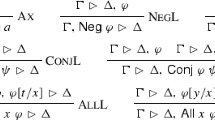Abstract
Based on inductive definitions, we develop an automated tool for defining partial recursive functions in Higher-Order Logic and providing appropriate reasoning tools for them. Our method expresses termination in a uniform manner and includes a very general form of pattern matching, where patterns can be arbitrary expressions. Termination proofs can be deferred, restricted to subsets of arguments and are interchangeable with other proofs about the function. We show that this approach can also facilitate termination arguments for total functions, in particular for nested recursions. We implemented our tool as a definitional specification mechanism for Isabelle/HOL.
Preview
Unable to display preview. Download preview PDF.
Similar content being viewed by others
References
Barthe, G., Forest, J., Pichardie, D., Rusu, V.: Defining and reasoning about recursive functions: a practical tool for the Coq proof assistant. In: Hagiya, M., Wadler, P. (eds.) FLOPS 2006. LNCS, vol. 3945, Springer, Heidelberg (2006)
Berghofer, S., Wenzel, M.: Inductive datatypes in HOL - lessons learned in formal-logic engineering. In: Bertot, Y., Dowek, G., Hirschowitz, A., Paulin, C., Théry, L. (eds.) TPHOLs 1999. LNCS, vol. 1690, pp. 19–36. Springer, Heidelberg (1999)
Bertot, Y., Castéran, P.: Interactive theorem proving and program development: Coq’Art: the calculus of inductive constructions. Texts in theoretical comp. science. Springer, Heidelberg (2004)
Bove, A., Capretta, V.: Modelling general recursion in type theory. Mathematical Structures in Computer Science 15(4), 671–708 (2005)
Boyer, R.S., Moore, J.S.: A Computational Logic. Academic Press, New York (1979)
Dubois, C., Donzeau-Gouge, V.: A step towards the mechanization of partial functions: domains as inductive predicates. In: CADE-15 Workshop on mechanization of partial functions (1998)
Giesl, J.: Termination of nested and mutually recursive algorithms. Journal of Automated Reasoning 19(1), 1–29 (1997)
Giesl, J., Thiemann, R., Schneider-Kamp, P.: Proving and disproving termination of higher-order functions. In: Gramlich, B. (ed.) FroCos 2005. LNCS (LNAI), vol. 3717, pp. 216–231. Springer, Heidelberg (2005)
Gordon, M., Melham, T. (eds.): Introduction to HOL: A theorem proving environment for higher order logic. Cambridge University Press, Cambridge (1993)
Harrison, J.: The HOL Light theorem prover, http://www.cl.cam.ac.uk/users/jrh/hol-light
Krstić, S., Matthews, J.: Inductive invariants for nested recursion. In: Basin, D., Wolff, B. (eds.) TPHOLs 2003. LNCS, vol. 2758, pp. 253–269. Springer, Heidelberg (2003)
Lee, C.S., Jones, N.D., Ben-Amram, A.M.: The size-change principle for program termination. In: ACM SIGPLAN-SIGACT Symposium on Principles of Programming Languages, pp. 81–92 (2001)
Manolios, P., Moore, J.S.: Partial functions in ACL2. J. Autom. Reasoning 31(2), 107–127 (2003)
Müller, O., Slind, K.: Treating partiality in a logic of total functions. The Computer Journal 40(10), 640–652 (1997)
Nipkow, T., Paulson, L.C., Wenzel, M.T.: Isabelle/HOL. LNCS, vol. 2283. Springer, Heidelberg (2002)
Paulson, L.C.: A fixedpoint approach to implementing (co)inductive definitions. In: Bundy, A. (ed.) CADE 1994. LNCS, vol. 814, pp. 148–161. Springer, Heidelberg (1994)
Slind, K.: Function definition in Higher-Order Logic. In: von Wright, J., Harrison, J., Grundy, J. (eds.) TPHOLs 1996. LNCS, vol. 1125, pp. 381–397. Springer, Heidelberg (1996)
Slind, K.: Reasoning About Terminating Functional Programs. PhD thesis, Institut für Informatik, TU München (1999)
Slind, K.: Another look at nested recursion. In: Aagaard, M.D., Harrison, J. (eds.) TPHOLs 2000. LNCS, vol. 1869, pp. 498–518. Springer, Heidelberg (2000)
Urban, C., Tasson, C.: Nominal techniques in Isabelle/HOL. In: Nieuwenhuis, R. (ed.) CADE 2005. LNCS (LNAI), vol. 3632, pp. 38–53. Springer, Heidelberg (2005)
Walther, C.: On proving the termination of algorithms by machine. Artif. Intell. 71(1), 101–157 (1994)
Author information
Authors and Affiliations
Editor information
Editors and Affiliations
Rights and permissions
Copyright information
© 2006 Springer-Verlag Berlin Heidelberg
About this paper
Cite this paper
Krauss, A. (2006). Partial Recursive Functions in Higher-Order Logic. In: Furbach, U., Shankar, N. (eds) Automated Reasoning. IJCAR 2006. Lecture Notes in Computer Science(), vol 4130. Springer, Berlin, Heidelberg. https://doi.org/10.1007/11814771_48
Download citation
DOI: https://doi.org/10.1007/11814771_48
Publisher Name: Springer, Berlin, Heidelberg
Print ISBN: 978-3-540-37187-8
Online ISBN: 978-3-540-37188-5
eBook Packages: Computer ScienceComputer Science (R0)




